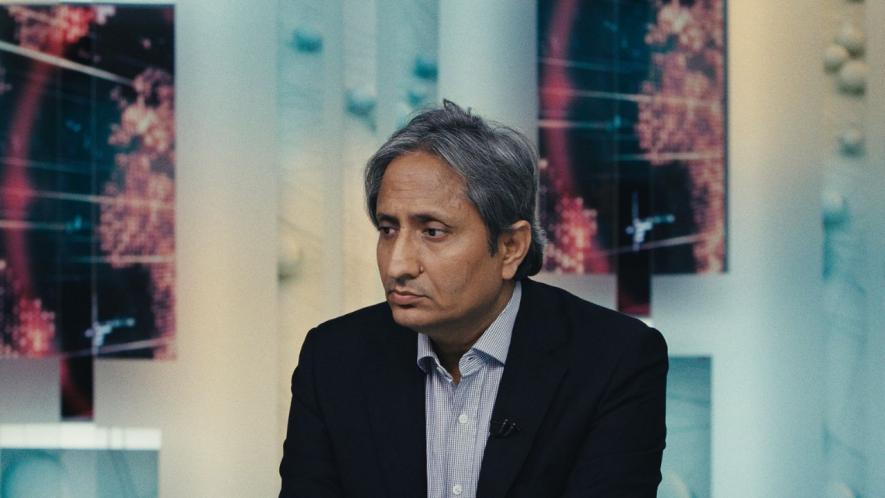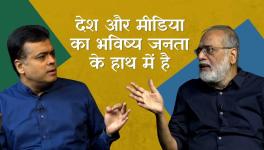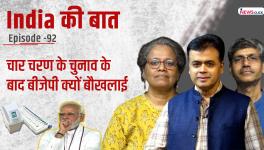The Crisis of Television News and Ravish Kumar

In the 21st century, television has emerged as an important part of the Indian masses and culture. News can now reach villages, small towns and slums. The public sphere developed along with the making of a network. Those who were far from the centre were brought closer. This has strengthened Indian democracy at the ground-level. Illiteracy is not a barrier to consuming messages from the television. In a country like India, where crores remain illiterate even today, evidently television as a medium has emerged as a substitute of the newspaper.
There are over 400 news channels in the country. Despite that, when it comes to credibility and consistency of news, people are more inclined to believe the newspapers. Why is that? Why has the TV news industry not been able to establish its credibility among people in the past two decades?
There is also the question of how interested the audience is in watching serious issues concerning public welfare? When late journalist Surendra Pratap Singh (SP Singh) gave Hindi television news a professional turn, people’s attraction towards TV news certainly grew, but later, under the pressures of the market, the government and TRPs, television channels crafted a new definition of news in which the truth and the search for truth did not matter anymore.
After the arrival of online news websites, the crisis of TV news channels has worsened. Apart from a few exceptions, their financial situation is utterly weak. They have to depend on advertisements for resources. They have to work bearing the pressures of the market and the authorities. Ridden with debt, the founder of NDTV news channel, Prannoy Roy, had to sell his channel to the Adani group after which many well-known journalists, including Ravish Kumar, handed in their resignation letters.
Some days ago, I saw Vinay Shukla’s documentary “Namaskar, Main Ravish Kumar”. This film has not been officially released in the country yet. Lately, many documentary films made in India may have been discussed in national and international events, but the documentary producers-directors have to always remain in search of audiences and distributors.
As the name conveys, the documentary is centred around Ravish Kumar, star anchor and TV journalist, who was associated with NDTV for about 25 years. The extremist-national cacophony in the Narendra Modi government’s time, and his courageous journalism and life struggles become the subject of this documentary film. Along with this comes the contemporary times and our society.
The documentary is also a sharp commentary on the workings of the TV news industry. As the TV channel’s resources dried up, the role of the reporter also faded away. Debates and discussions began happening in studios following a pre-designed pattern. Providing credible news and its analysis became unimportant and loud screaming became essential. It is important to note here that TV anchors get big pay cheques for this work.
Whether authority is political or religious, it doesn’t like questions. In a democratic system, mediapersons ask questions to the authorities as representatives of the public. Ravish Kumar presents issues of the people in a simple and witty manner. He asked questions to the authority through his journalism, for which he has paid a price. As his credibility and fame grew among the common people, he kept getting more and more isolated. The way this documentary brings forward his moments with his little daughter is very moving.
It is unfortunate that he has received many kinds of threats for doing his job. Ravish Kumar is no exception. In the past few years, a system has developed with the government’s support that depends on peddling lies and propaganda. They spread rumours for political ends. Sudhir Mishra’s recent film ‘Afwah’ deals with this issue. They easily target journalists who refuse to bend to their wishes.
Lately, India is being called the ‘Mother of democracy’ on national and international platforms. The media of the biggest and oldest democracy of the world is not independent and this points towards the crisis of democracy. Journalism is public service, but today it’s not easy to pursue journalism as a profession.
India is ranked 161 out of 180 countries in the World Press Freedom Index. Despite this, we have among us many journalists who stay away from glamour and risk their lives to bring out the truth to the society. In 2019, when Ravish Kumar received the Ramon Magsaysay Award, his journalism was described as “the voice of the voiceless committed to truth.” While Hindi TV news is delivering entertainment and controversies, commitment to truth has been left far behind.
In the whole world, globalisation has led to the rise of Right-wing forces and extremist nationalism in the past two decades. It is also important to ask what has been the dominant trend of Hindi news channels in these 20 years? Being the major medium of mass communication, did their concerns align with the public? Did they strengthen the public through news and debates so they could fulfil the role of an aware citizen?
Liberalisation (1991), privatisation, globalisation is the major cause of media capitalism in the open economy. It might have an autonomous culture, but it has remained a part of the corporate world. The changes that the Indian society and politics experienced after globalisation, also impacted media and especially linguistic media.
This documentary’s effect seems incomplete and scattered. Many questions, like how the NDTV kept getting debt-ridden do not get any commentary. For a complete picture, it is also necessary to question the nexus of capitalism and the media. Whenever we try to analyse the workings of media, we will have to investigate the relations between capitalism and media as well. Just like any other capitalistic venture. The major goal of the TV news industry is getting TRPs and earning profits, due to which the issues of the people and their welfare have been left somewhere far behind.
The writer is an independent journalist and researcher. The views are personal.
Get the latest reports & analysis with people's perspective on Protests, movements & deep analytical videos, discussions of the current affairs in your Telegram app. Subscribe to NewsClick's Telegram channel & get Real-Time updates on stories, as they get published on our website.
























